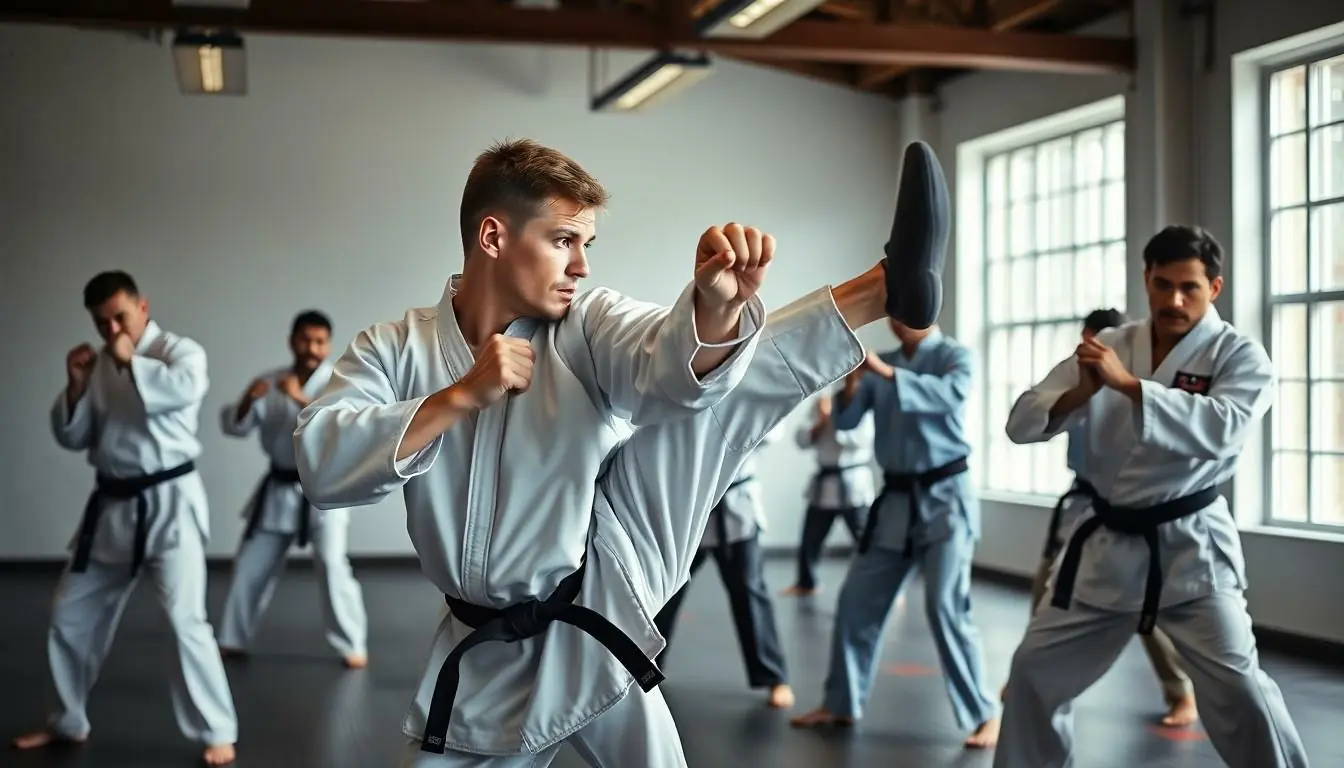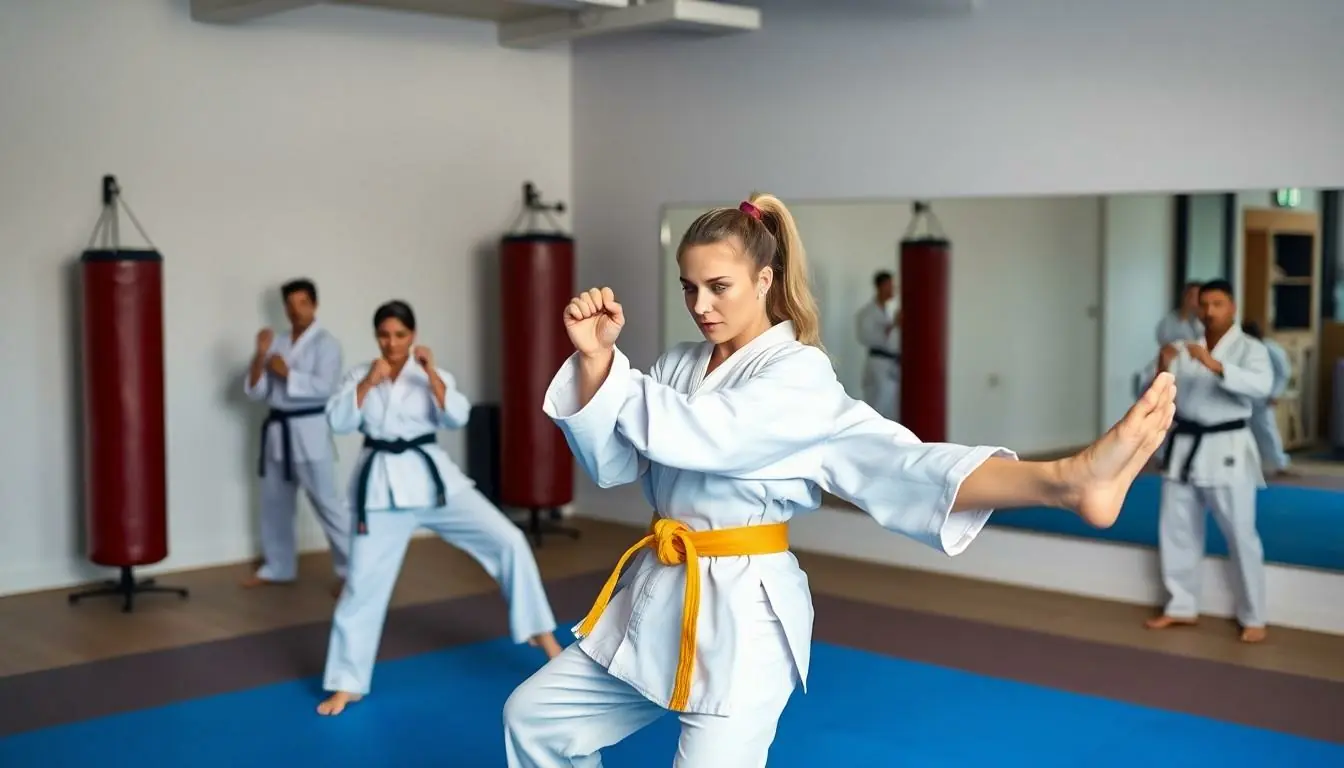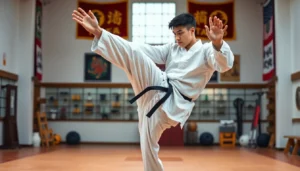Table of Contents
ToggleIn a world where stress levels soar higher than a black belt’s flying kick, adult martial arts classes offer a refreshing escape. Imagine swapping your couch for a dojo and trading Netflix marathons for high-energy workouts. Not only does it promise a solid sweat session, but it also equips you with skills to defend your pizza from any rogue slice-stealers.
Overview of Adult Martial Arts Classes
Adult martial arts classes offer a compelling mix of fitness and personal growth. Participants engage in physical workouts that enhance strength, flexibility, and endurance. Self-defense techniques taught in these classes equip individuals with essential skills for protecting themselves in real-life situations.
Various disciplines exist within adult martial arts, including karate, judo, taekwondo, and Brazilian jiu-jitsu. Each discipline provides unique benefits; for instance, karate emphasizes striking techniques, while judo focuses on throws and grappling. Individuals can choose classes that align with their interests and goals.
Structured lessons in adult martial arts classes cater to different skill levels. Beginners receive foundational training, allowing them to progress safely. Advanced practitioners can refine their techniques and participate in competitions.
Many martial arts studios foster a supportive environment, encouraging camaraderie among students. This community aspect enhances motivation, making workouts more enjoyable. Class schedules typically accommodate busy lifestyles, with options for evening and weekend sessions.
Skill development is gradual, often measured through belt promotions that signify progress. The journey inspires self-discipline, focus, and commitment. Participants frequently report improved confidence and mental clarity as they advance in their training.
Benefits of Adult Martial Arts Classes

Adult martial arts classes offer numerous benefits across physical and mental domains. Engaging in these activities facilitates personal growth and enhanced fitness.
Physical Health Benefits
Martial arts training significantly improves cardiovascular health, increasing endurance and stamina during workouts. Participants develop strength and flexibility through various techniques, helping to tone muscles effectively. Regular practice contributes to weight management, burning calories during intense sessions. Joint health benefits from the stretching and movement involved in martial arts, reducing the risk of injury. Enhanced coordination develops through detailed movements, improving overall athletic performance.
Mental Health Benefits
Mental clarity improves with consistent martial arts practice, as training focuses attention away from daily stressors. Self-discipline flourishes in structured environments, encouraging goal achievement and perseverance. Increased confidence emerges as practitioners master techniques, fostering a sense of accomplishment. Resilience builds through overcoming challenges faced during training, teaching valuable coping mechanisms. Community support enhances motivation and personal connections, contributing to an uplifting atmosphere that nurtures mental well-being.
Types of Adult Martial Arts Classes
Adult martial arts classes encompass a variety of disciplines, each offering distinct techniques and benefits. Participants can choose from several classes based on their preferences and goals.
Karate
Karate emphasizes striking techniques, focusing on punches, kicks, knee strikes, and open-hand techniques. This discipline builds strength, agility, and coordination through repetitive training. Foundational techniques often include stances and kata, which are choreographed movements. Adult students appreciate karate for its structured approach to self-defense and physical fitness. Additionally, many dojos foster a sense of community, encouraging participants to develop not only martial skills but also friendships.
Taekwondo
Taekwondo features dynamic kicking techniques and high-energy movements, appealing to those seeking a fast-paced workout. Routines often include sparring, forms, and self-defense techniques. Flexibility and balance become essential as students progress in this Korean martial art. Many adults enjoy the challenge of competitive sparring, which enhances focus and mental sharpness. Classes incorporate fitness training, improving overall physical condition while fostering self-discipline and respect.
Brazilian Jiu-Jitsu
Brazilian jiu-jitsu focuses on ground combat and grappling, emphasizing leverage and technique over brute strength. Adults learn to navigate various positions and submissions, equipping them with effective self-defense skills. Training often involves live rolling, enhancing practical application in real-world scenarios. Participants gain confidence and resilience as they master techniques, often forming strong bonds within the dojo. This discipline also supports overall fitness, dramatically improving endurance and core strength.
Muay Thai
Muay Thai, known as the “Art of Eight Limbs,” utilizes punches, kicks, elbows, and knees, providing a comprehensive striking system. Classes prioritize conditioning, often incorporating pad work and bag drills to boost cardiovascular fitness. Students appreciate the high-energy atmosphere and the focus on mental toughness. Many adults enjoy the challenge of Muay Thai, enabling them to develop self-defense skills while fostering camaraderie within their training groups. Over time, practitioners experience enhanced physical capabilities alongside improved focus and determination.
Choosing the Right Class
Selecting the ideal adult martial arts class requires careful consideration of personal objectives and preferences. Evaluating goals helps in finding a suitable fit for training needs.
Evaluating Your Goals
Identifying fitness goals and self-defense objectives provides a clear direction in your martial arts journey. Whether aiming to improve physical fitness or learn practical self-defense, clarity enhances choice. Considerations might include developing strength, boosting flexibility, or enhancing endurance. Individuals looking for competition opportunities may prefer classes focused on sparring or tournaments. Self-discipline and mental resilience play significant roles in the decision-making process as well. Aligning personal aspirations with class offerings is crucial to fostering a fulfilling experience in martial arts.
Class Environment and Culture
Examining the class environment and culture determines the overall experience during training. A supportive and inclusive atmosphere encourages participation and accelerates skill development. Studios often promote camaraderie among students, creating bonds through shared experiences. Observing a class can offer insights into the instructor’s teaching style and the class dynamic. Reputable studios typically emphasize respect, discipline, and teamwork among practitioners. Finding a community that aligns with personal values enhances motivation, ensuring a positive martial arts journey. Prioritizing these elements can lead to a rewarding and enriching training experience.
Adult martial arts classes present an excellent opportunity for individuals seeking a holistic approach to fitness and personal development. With a variety of disciplines to choose from participants can find a class that aligns with their interests and goals. The combination of physical training and mental discipline fosters not only improved health but also greater self-confidence and resilience.
Engaging in these classes offers a chance to connect with a supportive community that motivates and inspires growth. Whether someone is looking to enhance their fitness level learn self-defense or simply enjoy a new hobby adult martial arts classes provide a rewarding and transformative experience. Embracing this journey can lead to lasting benefits that extend beyond the dojo.




